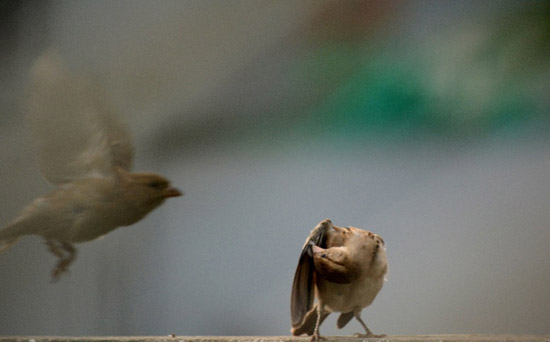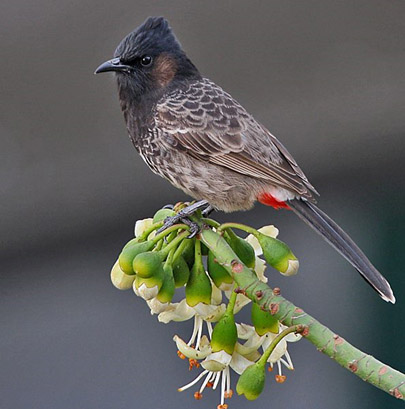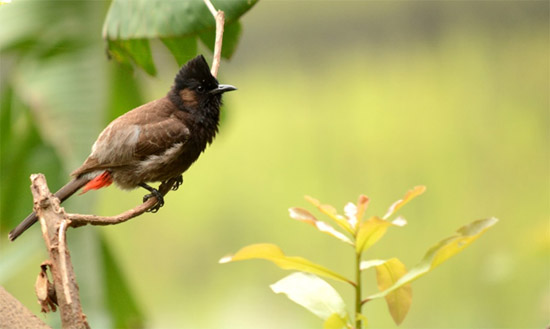A Moment of Success
Last year, around the middle of April, something happened which changed my thoughts about life.
For as long as I can remember, a number of bulbul* birds have always built their nests in the hanging plants that grow in the pots that my mother places just outside our house every year. They always seem to mind their own business during their short stay and are welcomed by our family too.
Their stay starts with them building up a small nest in the pots where they then lay their eggs. Later, the babies arrive, and the parents fly away with their little ones when the babies are old enough to spread their wings.
That particular year, my dad decided to take a look inside their nest and gladly told us that there were two babies this time. Everything was going well. We saw the parent birds coming to the nest with food in their beaks, and their beautiful songs filled our mornings and evenings.
One sunny day, my mother suddenly noticed that there was a sad, lonely sound coming from the nest. The parent birds seemed to have disappeared. I climbed up the ladder to check inside the nest. Much to my surprise and disbelief, there was a small baby bird dying inside, as little insects fed on its body. Even in that state, the baby bird managed a little cry for help. I realized the parents had left, taking the stronger baby with them. It seemed that they did not want to trouble with the other sick one.
I put the baby bird between my hands and used one of my old soft eye-shadow brushes to take away those terrible insects. After a few moments, the bird seemed to realize that it had a chance to live, and so it started to move its little wings to throw off any insects that were still on its body. We kept the little bird in a box in our guest room and fed it every thirty minutes. Its meals were made of rice and some healthy food powder mixed together.
The bird began to grow, with beautiful feathers that took the place of the bare skin it had before, and we became quite fond of it. After the feathers grew back, it needed to learn to fly. We made sure to keep the windows closed so that it could practise flying inside the room. With proper meals and freedom to fly, the little bird now turned out to look very much like the parents who had left it behind to die.
Soon, the little bird was able to fly up to the highest part of the room all the way from the floor, and was able to pick up small bits of food with its beak. Therefore, we decided to let it go, as it seemed to be ready for the real world.
As it flew away for the very last time, I could only imagine what a moment of success it must have been for that sick little bird, which, to begin with, was not good enough for its parents. I realized that with love and care from others it had become strong enough to enter the world on its own at last. I realised that the same thing is true for people too. All of us need the love and care of others before we can ‘fly’ by ourselves.

_________________________________________________________________________________________________________________________
Vocabulary
These words come from the second 1000 General Service High Frequency Word List
Learn the meanings of these words. Make sure you also know how to spell them and how to say them.
| baby/babies | during | meals | practise |
| bare | feathers | mixed | rice |
| beak | healthy | nest | sick |
| bits | imagine | parents | skin |
| brush/brushes | insects | pick (up) | suddenly |
| check | ladder | pot | terrible |
| climbed | managed | powder | wings |
* bulbul: A bulbul bird is a common bird found in many parts of the world, including Bangladesh.
___________________________________________________________________________________________________________________
Comprehension Questions
- What are the regular activities of bulbul birds who live in the writer’s verandah?
- Why did the author check the nest?
- What kind of trouble might cause a baby bird to cry for help?
- How did the author take care of the little bird?
- What do you think was the main message of the story?
- In your opinion, what does the last line of the story mean?

Grammar
Notice the simple past tense verb forms used in the following sentences:
- Last year, around the middle of April, something happened which changed my thoughts about life.
- My dad decided to take a look into their nest and gladly told us that there were two babies this time.
| Present form | Past form | Past participle form |
| Regular (add -ed at the end) | ||
| happen | happened | happened |
| change | changed | changed |
| decide | decided | decided |
| Irregular (These are all different, so they must be memorised) | ||
| tell | told | told |
| be | was/ were | been |
Find five sentences from the story that use simple past tense verb forms. Put a circle around the verbs that are in the past tense.

Speaking Vocabulary Production Activity
- Begin to learn the vocabulary from the story. Put the words in your vocabulary notebook and write the meaning beside each word in your own words. (Do not copy the meaning directly from the dictionary.)
- Work with a partner, or someone who speaks English
- Tell the story again, in your own words, to your partner
- Try to use as many of the words on the vocabulary list as you can, as you tell the story
- First, take three minutes to plan what you are going to say, then take five minutes to retell the story.
- As you tell the story, you partner will look at the list of vocabulary. Every time your partner hears you say one of the words on the vocabulary list, they should put a check mark beside that word (e.g. P). (Any form of the word is OK and you may count and use a word more than once.)
- After five minutes, it will be your partner’s turn to tell the story, and your turn to listen for the vocabulary and check it on your list. Don’t forget, take only five minutes each!
- When you have finished, count how many words you were able to use from the vocabulary list. How did you do?
- Go back and review the words. In your vocabulary notebook, write a sentence of your own using each word. Do not copy sentences from the dictionary.
Writing Vocabulary Production Activity
- Write a short story about something that happened in your life in the past.
- Take three minutes to plan what you would like to write, but do not write your ideas down yet. Just think!
- Next, take eight minutes to write, no more. Try to use as many words from the vocabulary list in your writing. Remember, you will mostly need to use simple past tense verb forms.
- Give your writing to someone else who has also read the story (‘A Moment of Success’) to read. If they have also written their own short story, read what your partner has written. Discuss your story/stories together.